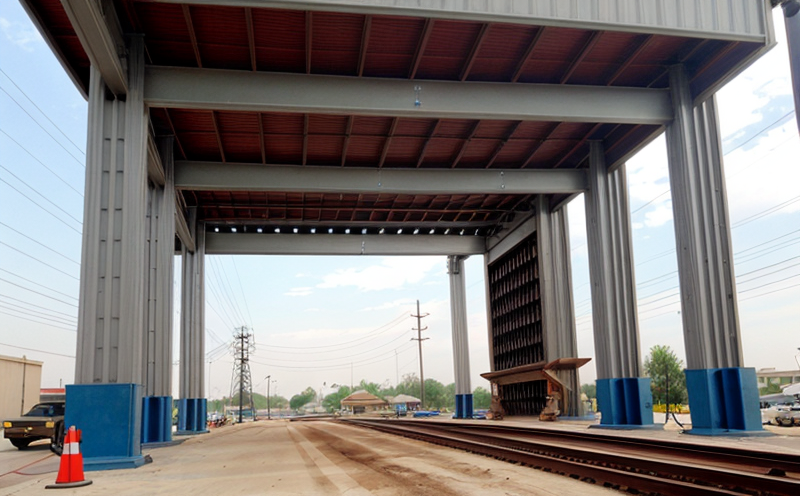MIL-STD-810 Temperature Shock Testing of Aerospace Components
The Military Standard MIL-STD-810 sets stringent testing and evaluation procedures to ensure that components, subsystems, or systems perform reliably under various environmental conditions. One critical test within this standard is the temperature shock test. This test evaluates how aerospace components withstand rapid changes in temperature, which can occur during flight operations.
During a MIL-STD-810 temperature shock test, specimens are subjected to sudden and extreme temperature variations that simulate real-world conditions experienced by aerospace equipment. These tests are essential for ensuring the durability, reliability, and safety of components used in aircraft, spacecraft, and other aviation systems. The rapid changes in temperature can cause thermal stresses on materials, potentially leading to cracks or failures.
Our laboratory follows the exact procedures outlined in MIL-STD-810 and applies them consistently across all tests. This ensures that our results are accurate, reproducible, and compliant with industry standards. Our testing protocols involve precise control of temperature changes, ensuring that the environment closely mimics actual conditions encountered during flight.
The test setup typically includes a controlled chamber capable of rapid heating and cooling cycles. The specimen is placed in this chamber, where it undergoes a series of temperature shocks. The specific parameters for each test are determined by the requirements set forth in MIL-STD-810, which can vary based on the type of component being tested.
For instance, testing might involve exposure to temperatures ranging from -55°C to +125°C, with rapid transitions between these extremes. These conditions simulate the thermal shock a component might experience during launch or landing, as well as in-flight scenarios where extreme temperature changes can occur due to altitude variations.
During the test, our technicians closely monitor the specimen's response to each temperature change, recording any signs of distress such as cracking, warping, or material fatigue. The data collected is used to determine if the component meets the required performance criteria specified in MIL-STD-810.
The testing process is not only about physical durability but also about ensuring that the component remains functional and safe under these extreme conditions. This is critical for aerospace applications, where failures can have severe consequences. By adhering to MIL-STD-810, we ensure that our clients receive accurate and reliable test results, which are essential for meeting certification requirements.
The results of the temperature shock tests provide valuable insights into the material properties and structural integrity of aerospace components. This information is crucial for quality assurance teams, who can use it to identify potential weaknesses in design or manufacturing processes. By addressing these issues early on, manufacturers can improve product reliability and reduce costly failures during service.
- Ensures compliance with MIL-STD-810 standards
- Provides accurate data for quality assurance teams
- Identifies potential weaknesses in design or manufacturing processes
- Improves product reliability and reduces costly failures during service
Quality and Reliability Assurance
Ensuring the quality and reliability of aerospace components is a cornerstone of our laboratory's mission. By adhering strictly to MIL-STD-810 standards, we provide clients with confidence that their products will perform reliably under extreme conditions. This is particularly important in the aerospace industry, where safety and performance are paramount.
Our laboratory employs highly skilled technicians who have extensive experience in conducting temperature shock tests according to MIL-STD-810. These tests are critical for verifying that components can withstand rapid changes in temperature without failing. By ensuring that these tests meet the required standards, we help our clients avoid costly mistakes and delays.
Our commitment to quality extends beyond just meeting the minimum requirements of MIL-STD-810. We go above and beyond by offering additional services such as accelerated life testing and thermal cycling simulations. These complementary tests provide even more comprehensive data on a component's performance, helping manufacturers make informed decisions about design improvements.
The results of our temperature shock tests are meticulously recorded and analyzed using advanced software tools. This ensures that the data is accurate, reliable, and consistent across all tests. Our laboratory also provides detailed reports that summarize the test findings, along with recommendations for improving product performance if necessary.
By working closely with our clients throughout the testing process, we ensure that they receive timely feedback on their products' performance. This collaborative approach allows us to identify potential issues early and work together to resolve them before full-scale production begins. This proactive stance not only enhances product quality but also helps prevent costly rework or recalls.
Our laboratory is fully equipped with state-of-the-art facilities that enable us to conduct a wide range of tests, including environmental stress screening (ESS), which complements temperature shock testing by exposing components to multiple stresses simultaneously. This comprehensive approach ensures that our clients receive the most accurate and reliable test results possible.





